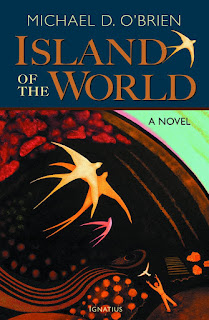The Island of the World
One of my very favorite works of fiction is The Island of the World by Michael O’Brien. You’ll see I have used quotes/excerpts from it and other quotes from the author quite a few times on this blog (see title of the book and author’s name under Labels). The following is from an interview with the author back in 2007 around the time it was first released. I highly recommend this book! – Kevin
Question: Tell us
about your new novel, The Island of the
World, to give readers a sense of it.
O'Brien: The Island of the World is the story of
a child born in 1933 into the turbulent world of the Balkans and tracing his
life into the third millennium. The
central character is Josip Lasta, the son of an impoverished school teacher in
a remote village high in the mountains of the Bosnian interior. As the novel
begins, World War II is underway and the entire region of Yugoslavia is torn by
conflicting factions: German and Italian occupying armies, and the rebel forces
that resist them—the fascist Ustashe, Serb nationalist Chetniks, and Communist
Partisans. As events gather momentum, hell breaks loose, and the young and the
innocent are caught in the path of great evils. Their only remaining strength
is their religious faith and their families.
Q: Is this primarily
a historical novel, or perhaps a political one?
O'Brien: No, it
is neither, though of course history and politics play important roles in the
story. Its primary focus is on persons, dramatized through the life of a
person, a soul. However, the history that is part of the plot recounts
accurately what happened, and as such the book may be somewhat controversial.
For more than a century, the confused and highly inflammatory history of
former-Yugoslavia has been the subject of numerous books, many of them rife
with revisionist history and propaganda. The peoples of the Balkans live on the
border of three worlds: the Islamic, the Orthodox Slavic East, and Catholic
Europe, and as such they stand in the path of major world conflicts that are
not only geo-political but fundamentally spiritual. This novel cuts to the core
question: how does a person retain his identity, indeed his humanity, in any
absolutely dehumanizing situation?
Q: How does he retain
his humanity?
O'Brien: In the
life of the central character, I try to show that this will demand suffering
and sacrifice, heroism and even holiness. When he is twelve years old, his
entire world is destroyed, and so begins a lifelong journey to find again the
faith which the blows of evil have shattered. The plot takes the reader through
Josip's youth, his young manhood, life under the Communist regime,
imprisonment, hope and loss and unexpected blessings, the growth of his
creative powers as a poet, and the ultimate test of his life. This novel is
about the crucifixion of a soul — and resurrection.
(Entire interview can be found at: http://www.ignatiusinsight.com/features2007/mobrien_interview_dec07.asp)
(Entire interview can be found at: http://www.ignatiusinsight.com/features2007/mobrien_interview_dec07.asp)

Comments